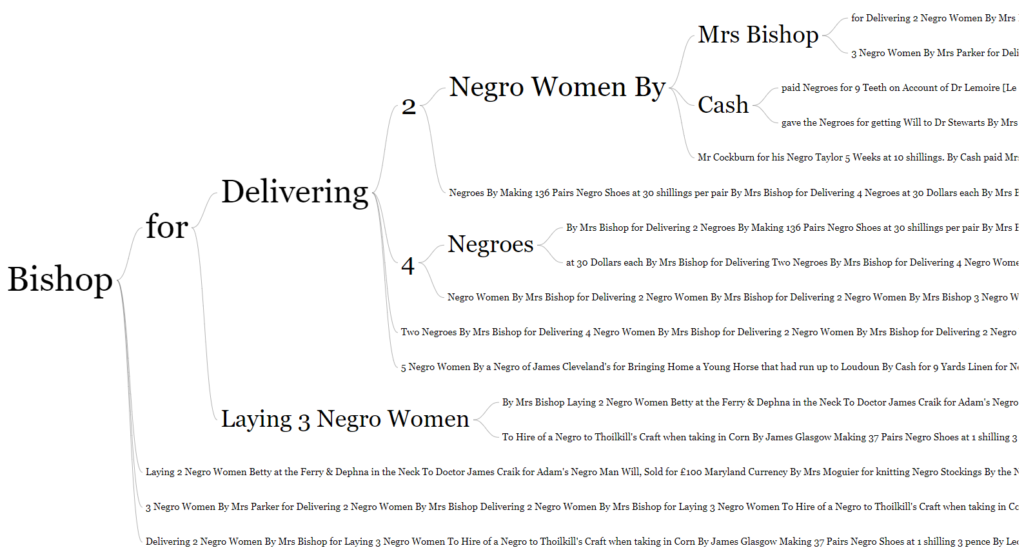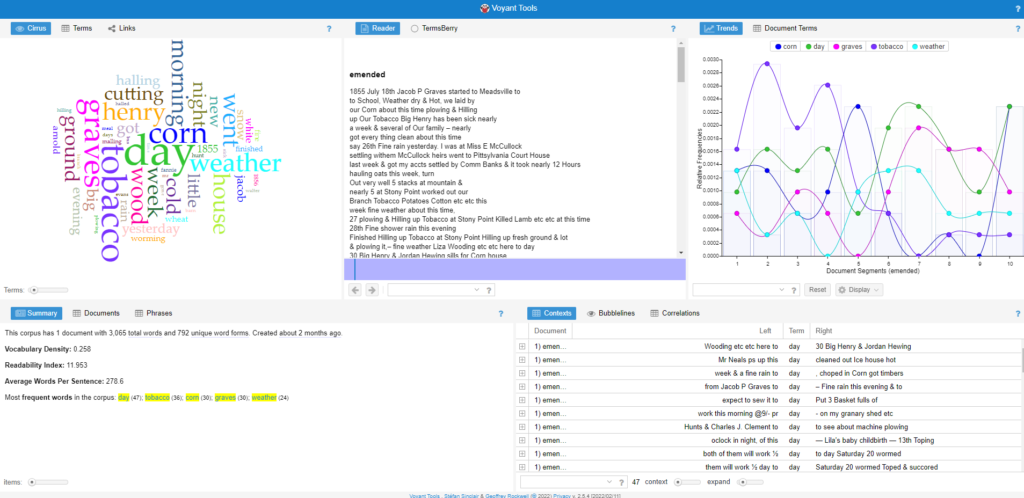If you're planning on using FromThePage in the classroom, you might find the following useful.
1) Making collections private
Can an owner restrict access to collections or works? Yes, access can be restricted at the collection or work level, though not at the level of a specific page.
How do I manage access to my collections? After you sign in, go to the Owner Dashboard by clicking the Dashboard button. Select the collection you want to restrict. In the Settings tab, click the "Make Collection Private" button to restrict visibility to the owners of the collection. Additional owners can be added in the dropdown box below.
How do I manage access to my works? After you sign in, go to the Owner Dashboard by clicking the Dashboard button. Click the link for the work you would like to restrict. In the Settings tab for the work, select the "Restrict collaborators" checkbox and then hit apply. Once collaborators are restricted, a dropdown box appears where collaborators can be added.
2) The "Versions" tab on a page

You can see all page revisions and compare the changes have been made in each revision by clicking on the Versions tab of a page. The left column shows the page title and transcription in the selected revision, while the right column shows what has been changed. Unchanged text is highlighted in white, deleted text is highlighted in red, and inserted text is highlighted in green color.
Using the Versions tab, you can compare an original student transcription with a second pass to review and edit by a different student.
3) The export tab on a work, specifically the "export to Voyant" and "export to Word Trees"
Export to Voyant

Voyant Tools is a popular digital humanities text analysis tool.
It is designed to assist scholars in the digital humanities, who use textual data to study language, culture, and history.
Export to Word Trees

A word tree use word frequencies from the root of the tree, listed in order, with their relative weight represented by the font size.

What have other people done?
- Rebecca Nesvet (English)
- Rebecca Nesvet is Assistant Professor of English Literature at University of Wisconsin, Green Bay. She teaches a course called English 364: The Sweeney Todd Project. She uses FromThePage to transcribe The String of Pearls,which was published as a periodical serial in 1846-1847.
- “We started using FromThePage because Ben gave us permission to test it for him, for which I’m very grateful. It cut down on the time and the frustration, and it massively improved the accuracy of our transcriptions, which is still not perfect. (We’re proofreading the earliest-transcribed chapters now—as I suppose any similar project requires.) But FromthePage really helps and students appreciate having access to it. Also, I appreciate that everyone in the class can work on their own part of the transcription at the same time. That’s really very useful.”
- “It’s great that FromThePage is accessible to every student enrolled as a contributor. It doesn’t discriminate in favor of those with fancier or more reliable IT resources—or in favor of well-supported ‘traditional’ students. Using FromThePage, everyone can transcribe with equal ease.”
- Laura Morreale (Medieval French and Italian)
- Dr. Laura Morreale is the Independent Scholar of Medieval Francophonie and Italian Historiographies. Her projects involve transcribing manuscripts and translating one or a set of manuscript transcriptions into English.
- “I have used FromThePage in the classroom to teach students about the material in question (a particular manuscript, hand or text) and have found transcription to be an enormously effective tool. In the process of transcription, students come to have a feel for the source they would not otherwise have gotten. They come to speak about the author or scribe as an individual, as they come to know the hand, how the scribe abbreviated something or the preferred letter forms; it makes the text more personal, and students appreciate it as the work of another human, not just an abstraction of ideas on a printed page.”
- Adam (Classics, honors class)
- University of Texas at Austin Classics professor, Adam Rabinowitz, uses FromThePage as a teaching tool in an undergraduate course. The class — "Tales of the Trojan War: from Bronze Age to Silver Screen"— works with a collection of letters from Alexander Watkins Terrell.
- Each student is assigned to find the primary source materials in the archive and transcribe any letter in the collection using FromThePage. After they transcribe their letter, Dr. Rabinowitz reviews and edits the student’s work on FromThePage, sometimes using the “Versions” tab to show the difference between the student’s work and his edits. Then a larger collection of transcribed letters are provided to write a paper.
- Dr. Julie deGraffenried at Baylor University (freshman history; service)
- The Evangelia Settlement was one of the earliest known settlement houses in an urban area of Texas as well as the first daycare program for underprivileged children in Waco. Dr. deGraffenried helped pilot an in-class civic engagement project for her freshman history majors.
- “Over the course of the project’s completion, my students were introduced to archives and a special collection at Baylor, introduced to FromThePage and the practice of transcription, introduced to the idea of transcription as a public service that history enthusiasts can perform for the public, and learned how big movements (like Progressivism) affected local communities.”
- Middlebury College
- Patrick Wallace is the Digital Projects & Archives Librarian of Middlebury College. Middlebury College Special Collections has been using FromThePage mainly to transcribe manuscript letters related to Anglo-American literature, the American Civil War, and the Abolitionist movement.
- “Asking students to transcribe letters encourages them to engage with archival materials in many different ways, as both texts and material objects. Integrating transcription work into students coursework can also create a productive feedback loop between student researchers and Special Collections, as we re-integrate their work into the archives.”
- “Supporting instructors who integrate our manuscript collections into their lesson plans has been very productive.”
- “For example, a student provided with a letter to transcribe might view transcription only as a component of their coursework - a chore to satisfy their professor and the chance to learn something about using primary sources, but without any lasting importance beyond the end of the semester. When students know their work will become an integral part of the archives, the same assignment can offer them the satisfaction of making tangible contributions to a broader enterprise, and illustrates the iterative nature of scholarship and the labor of knowledge production as a praxis. For the archivist, of course, collaborating with students and instructors means that the more our collections are used, the more they are enriched.”
- “Any technology that makes information lifecycles more transparent, participatory, and recursive also has the potential to make liberal arts and humanities scholarship more collaborative and democratic as a whole.”
- Dartmouth Library
- "Samara Cary, a Digital Project Specialist in DxDL, coordinates transcription volunteers for FromThePage and partners with staff and faculty who use this tool in their teaching and research work."
- "Transcribing Lorne’s diarized words into FromThePage has become a powerful learning tool in Ross Virginia’s Environmental Issues of the Earth's Cold Regions class. For Ross, “history isn’t separate from science,” and “understanding the past is a way to consider the future of the Arctic.”"
- "By transcribing a diary on FromThePage that very few people have yet read, the 41 students in Ross’s class are ensuring a unique piece of history becomes an accessible fixture in the body of knowledge covering the Arctic and Arctic exploration."
- "These students’ transcription and indexing work will become a permanent part of “Collating Wrangel Island,” the Libraries’ digital collection of expedition papers and documents. The Libraries’ process of encoding the transcription and metadata means the students have their names (and labor) permanently attached to the diary’s digital publication."

